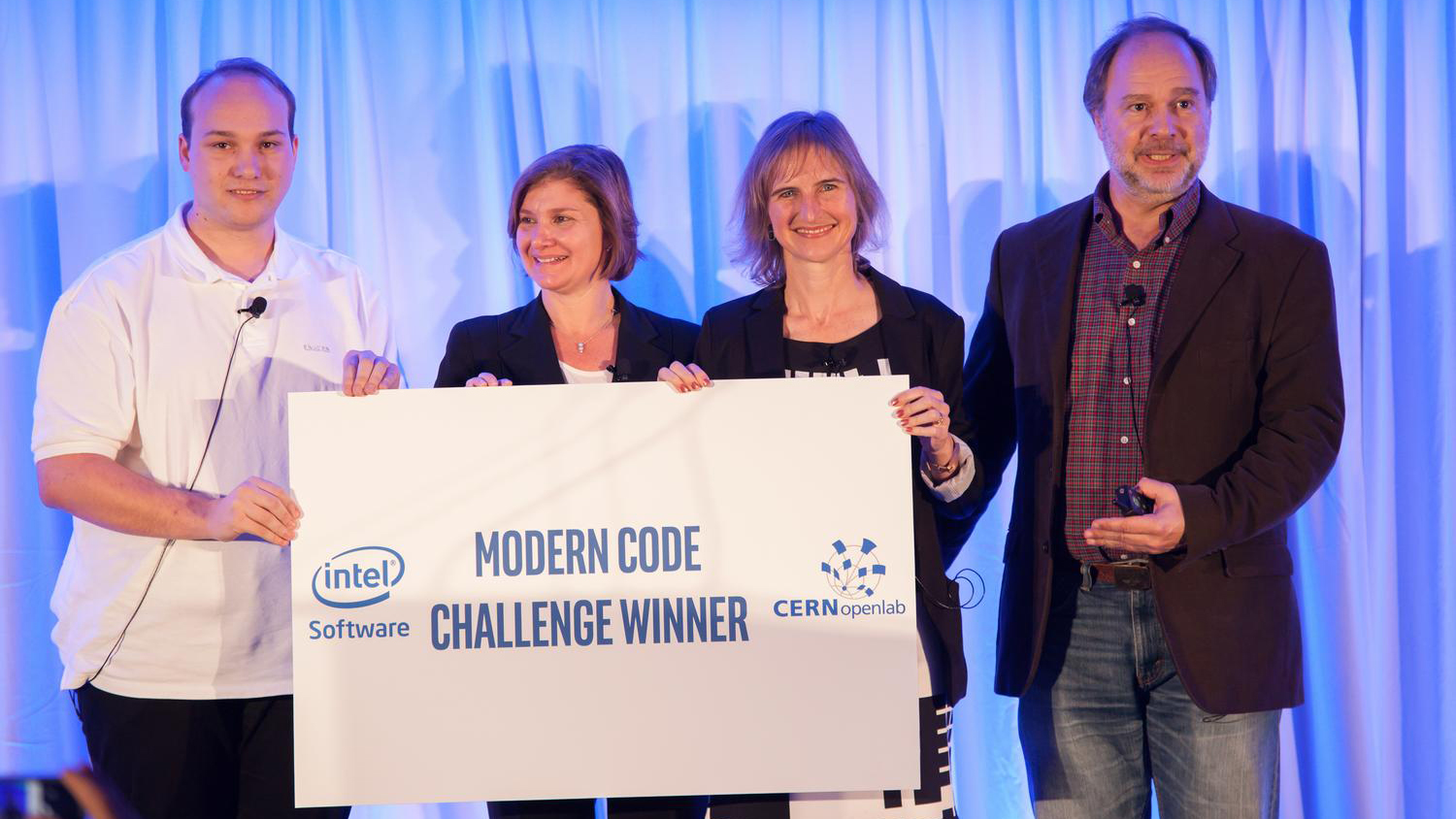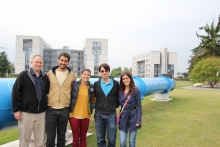
Code challenge winners come to CERN
Last week, winners of the Intel Modern Code Challenge came to CERN. They met leading researchers and toured the laboratory’s world-leading facilities, including the ATLAS and CMS experiments, the antimatter factory, the data centre, and more.
Last year, Intel and CERN openlab jointly announced the winners of the Intel® Modern Code Developer Challenge at the annual Intel HPC Developer Conference. The goal of the competition, which was open to students across the globe, was to spur advancement in parallel coding and the science it supports, as well as encouraging students to pursue careers in the field of high-performance computing.
Students were challenged with optimising code used to simulate brain development. This code is focused on simulating the development of the normal and diseased brain, in order to identify the causes and potential treatments for brain disorders such as epilepsy and schizophrenia. The code is an integral part of a current CERN openlab research project called BioDynaMo
The challenge attracted over 17,000 students from around the world representing over 130 universities across 19 countries. Over 1,200 students downloaded the code and over 1,000 participated in the free online training programme, choosing from over 20 hours of educational materials. These students had remote access to Intel® Xeon® processor and Xeon Phi™ coprocessor-based clusters. Students were also provided free copies of the Intel® Parallel Studio XE Cluster Edition for their code optimizations.
Challenge champions
Mathieu Gravey from Ecole des Mines d’Alès in France, was declared the grand prize winner. Impressively, he was able to reduce the code’s runtime on a large dataset  from 45 hours to just under eight and a half minutes! He won a place in this year’s popular CERN openlab summer student programme. “I entered the competition because I wanted to have access to Intel’s Xeon Phi,” says Gravey. “I had previously been working with GPUs, but wanted to play around with another accelerator — it was very exciting”. He continues: “To me, this sort of code modernisation is really fun. It’s like being able to change from a normal car to a Ferrari — faster is always better!”
from 45 hours to just under eight and a half minutes! He won a place in this year’s popular CERN openlab summer student programme. “I entered the competition because I wanted to have access to Intel’s Xeon Phi,” says Gravey. “I had previously been working with GPUs, but wanted to play around with another accelerator — it was very exciting”. He continues: “To me, this sort of code modernisation is really fun. It’s like being able to change from a normal car to a Ferrari — faster is always better!”
Three other students — those with the second, third and fourth fastest optimisations of the code — also won a trip to come to CERN for a guided tour of the laboratory. These winners were as follows (in alphabetical order):
- Dominik Ernst, a Master’s student in computational science and engineering at Friedrich-Alexander University Erlangen-Nuremberg in Germany.
- Pablo Gonzalez De Aledo Marugan, a computer science PhD student at the University of Cantabria in Spain and the University of Macquarie in Sydney, Australia.
- Daniel Vea, a Bachelor’s student in electronic engineering at the La Salle University in Barcelona.
Vea and Gonzalez De Aledo Marugan enjoyed a three-day tour of CERN last week. Ernst, who was selected — independently of the competition — to take part in this year’s CERN openlab summer student programme, recently spent nine weeks at the laboratory working on performance studies for different accelerators using OpenCL. As part of his time here, he also toured the laboratory’s facilities, as well as taking part in a series of dedicated academic lectures given by IT experts from CERN.
Other prize winners from the Intel Modern Code Developer Challenge are set to receive a trip to attend the upcoming ‘SC16’ supercomputing conference in Salt Lake City, Utah, USA.
From late-night coding sessions to CERN
Both Vea and Gonzalez De Aledo Marugan relished their time visiting CERN. “It’s been great,” says Vea. “I especially enjoyed meeting all these fascinating people and discovering the exciting challenges they’re working on.” Vea explains that upon entering the competition he hadn’t even dreamed of winning a trip to come to CERN. Instead, he was keen to use the videos, tutorials, and forums on Intel’s competition website to develop his coding skills: “It was a real challenge, but also a great excuse to learn something new. I used the tools on the site to develop my skills as I went along.”
Gonzalez De Aledo Marugan says that he worked two hours a day on the project — around his studies — every day for three weeks. “I would get up at 3am in the morning and work on the code then, because that’s when it’s most quiet and I feel really fresh and focused.” This hard work and dedication was certainly worthwhile: “I was very excited to come to CERN,” he says. “I expected it to be really amazing... and it was.”
Modern code for modern science
“We’re very pleased to be working with CERN openlab to help students learn and apply their new skills toward this advancing the state of high-performance computing.” says Michelle Chuaprasert, director of the independent software vendor and developer channel engagement team at Intel. “Researchers and businesses can innovate faster on today’s and tomorrow’s hardware by adopting modern programming techniques. So far this year Intel has engaged over 950,000 developers on code modernisation and we only see this number growing as we go forward.”
“Training the next generation of developers — the people who can produce the scientific code that makes world-leading research possible — is of paramount importance across all scientific fields,” says Alberto Di Meglio, head of CERN openlab. “We’re pleased to partner with Intel on this important cause.”
“CERN openlab has played — and today continues to play — a key role in the development of the computer platforms used by physicists to understand the particle collisions that take place in the LHC,” continues Di Meglio. “With future upgrades to the LHC and the detectors set increase data rates dramatically, work to optimise the code behind these computing platforms has never been more important than it is today.”
To find out more about the challenge, read Daniel Vea’s first-hand account of how he optimised the code. Also, be sure to check out Mathieu Gravey’s top five tips on how to modernise your code.











